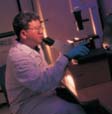 Stopping
cancer in its tracks "Blood vessels are the body's pipeline for nutrients - they are like pipelines bringing energy or water into a city. In cases of prostate cancer, urokinase burrows the pipeline into the tumor." Evans also believes urokinase plays a role in prostate cancer that doesn't respond to the suppression of testosterone, also known as hormone-refractory prostate cancer. Testosterone is like fertilizer for prostate cancer, much the way that estrogen helps breast cancer to grow. "Prostate cancer is androgen-regulated. Fifty years ago a scientist won the Nobel Prize for observing that removing testosterone improved survival for metastatic prostate cancer. Even today, most treatments involve injections of drugs that keep men with prostate cancer from producing the male sex hormone," says Evans. "But in all cases, prostate cancer eventually continues to grow in the absence of testosterone. We don't have a lot of options for men once this happens." A urologic oncology surgeon who splits his time between the operating room and the lab, Evans has been studying angiogenesis for more than 10 years. He started with a two-year stint at the Walter Reed Army Institute of Research collaborating with the Section of Tumor Invasion and Metastasis at the National Cancer Institute. Next he went to UC San Francisco for surgical and urology training and a one-year research fellowship from the National Kidney Foundation. This was followed by a two-year fellowship in urologic oncology at M.D. Anderson Cancer Center in Houston.
Home |
Table of Contents |
To our Readers |
Building on Basics UC Davis Health System | © 2000, 2001, 2002 UC Regents. All rights reserved. |
Postgraduate researcher Shyh-Jen Shih examines endothelial cells. |

